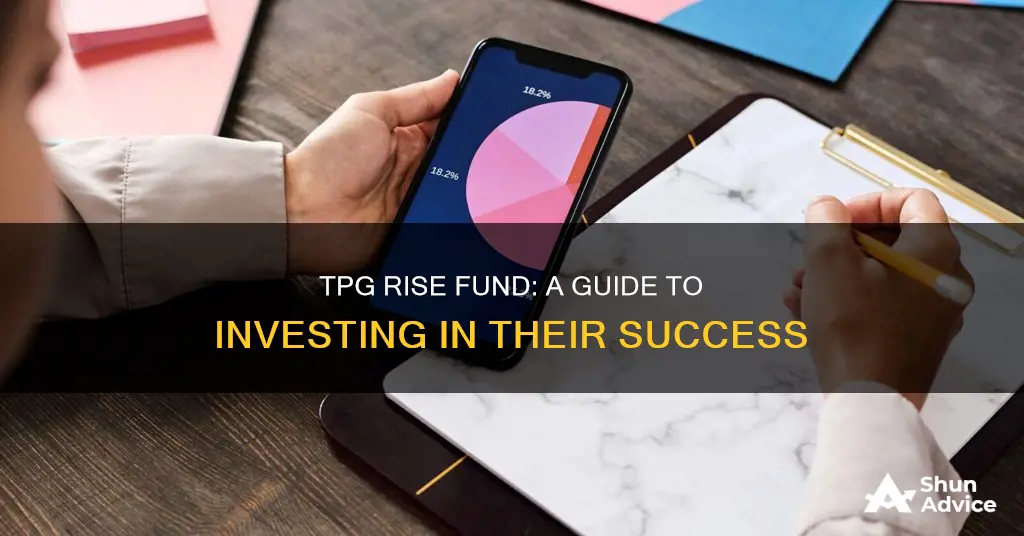
The Rise Fund, founded in 2016 by TPG in partnership with Bono and Jeff Skoll, is a global impact investing strategy that seeks to drive both competitive financial returns and measurable societal benefits at scale. With $18 billion in assets under management, it is one of the world's largest private equity impact investing platforms. The fund focuses on seven sectors: education, energy, food and agriculture, financial services, healthcare, information, and communication technology, and industrials and infrastructure.
The Rise Fund has committed to achieving social and environmental impact alongside financial returns. It seeks to partner with creative entrepreneurs and build successful businesses that drive meaningful, measurable positive change.
To invest in The Rise Fund, one must align with its impact-driven investment strategy and focus on sectors that create a positive and sustainable impact.
| Characteristics | Values |
|---|---|
| Type of Fund | Private equity, venture capital |
| Investment Focus | Climate and conservation, education, financial inclusion, food and agriculture, healthcare, impact services |
| Investment Size | $2 billion |
| Founding Partners | TPG, Bono, Jeff Skoll |
| Founding Year | 2016 |
| Location | San Francisco, California, United States |
| Number of Portfolio Companies | Over 40 |
| Number of Countries | Over 30 |
| Assets Under Management | $18-19 billion |
What You'll Learn

TPG Rise Climate's focus areas
TPG Rise Climate is a dedicated climate impact investing product that was established in 2021 to address the challenges of global climate change. It focuses on quantifiable carbon aversion and scaling innovative businesses. Its core areas of focus include:
Clean Energy
Clean energy is a key focus area for TPG Rise Climate. The fund invests in companies that are working to provide affordable and clean energy solutions, such as solar energy and batteries.
Enabling Solutions
TPG Rise Climate invests in companies that provide enabling solutions for decarbonization and the energy transition. This includes businesses that offer emissions reduction technology, carbon management, and accounting platforms.
Decarbonized Transport
The fund targets investments in companies that are working to reduce greenhouse gas emissions from transportation, such as those focused on electric vehicles and renewable fuels.
Greening Industrials and Agriculture
TPR Rise Climate also focuses on investing in companies that are working to reduce the carbon footprint of industrial and agricultural processes. This includes businesses that are decarbonizing and dewasting the textile industry and supporting local farming communities.
Natural Solutions
Another key area of focus for TPG Rise Climate is natural solutions. The fund invests in companies that are working on conservation and protection of the environment, such as those focused on renewable energy, bio-innovations, and protecting African wilderness.
Monthly Mutual Fund Guide: Investing $1000 Wisely
You may want to see also

The Rise Fund's investment criteria
The Rise Fund, founded in 2016 by TPG in partnership with Bono and Jeff Skoll, is a global impact investing strategy that puts commercial capital to work to help build profitable businesses that deliver positive and sustainable impact. The Rise Fund offers investment resources, business-building skills, and a global network to help portfolio companies accelerate growth and impact.
The Rise Fund's core areas of focus include climate and conservation, education, financial inclusion, food and agriculture, healthcare, and impact services. The fund seeks to partner with creative entrepreneurs and build successful businesses that drive meaningful, measurable, positive change.
The Rise Fund has a rigorous impact measurement process, creating new assessment tools to ensure that social impact can be measured and quantified. This process includes developing an evidence-based methodology for quantifying the impact of prospective investments, with a focus on generating an impact multiple of money (IMM), a measure of the social value created by a company per equity dollar invested.
- Climate and Conservation: The fund seeks to invest in businesses that enable affordable, reliable, and sustainable decarbonization across energy generation, transportation, and materials while conserving and protecting the environment.
- Education: The fund focuses on expanding access to high-quality education and boosting educational achievement, particularly for underserved populations.
- Financial Inclusion: The Rise Fund invests in companies that expand financial inclusion, reduce poverty, increase household and small business earnings, and enable access to essential services.
- Food and Agriculture: The fund supports businesses that help reduce hunger, increase food security, and promote sustainable agriculture.
- Healthcare: The Rise Fund invests in companies that reduce the cost of healthcare, increase access to high-quality health services, improve health outcomes, and decrease malnutrition.
- Impact Services: The fund seeks to invest in businesses that leverage software and mobile technology to drive efficiency, productivity, and innovation in various sectors, including education, healthcare, and financial services.
A Guide to Investing in ICICI Prudential Funds
You may want to see also

The Rise Fund's portfolio companies
The Rise Fund is an impact investing platform that works with growth-stage, mission-driven businesses to achieve the United Nations' Sustainable Development Goals. The Rise Fund has invested in over 89 companies, including:
- Hayden AI Technologies, Inc: Leveraging geospatial data collection sensor systems to provide smart city intelligence.
- PresenceLearning: Providing online therapy, behavioural and mental health services, and software.
- Banyan Treatment Centers: A provider of substance use disorder services.
- Idaho College of Osteopathic Medicine: A college based in Mountain View, California, US.
- Nithio Holdings: Focused on debt financing.
- Bicara Therapeutics: Focused on Series C funding.
- RefleXion Medical: Focused on venture round funding.
- UBQ Materials: Focused on venture round funding.
- Persefoni: Focused on Series C funding.
- SunCulture: Focused on debt financing.
- M-KOPA: Focused on debt financing.
- Green Monday Holdings: One of Asia's plant-based food leaders.
- Fork & Good: Focused on venture round funding.
- Valley: Focused on pre-seed round funding.
- GoHenry: Acquired by Acorns.
- Efficiency 2.0: Acquired by C3 AI.
- LawRoom: Acquired by EVERFI.
- GrantStream: Acquired by Benevity.
- Trust CSR Ltd: Acquired by Benevity.
- Olympus Terminals: Acquired by The Rise Fund in May 2024.
- Outcomes First Group: A UK-based provider of best-in-class education to young people and adults with autism, learning disabilities, and other complex Special Education Needs.
- Tata Technologies: Exited The Rise Fund portfolio in November 2023.
- Viewpoint Therapeutics: A company focused on improving eyesight worldwide.
- Allogene Therapeutics: A biotechnology company transforming the biotech industry.
- LIVEKINDLY Collective: One of the world's largest plant-based food companies.
- Fourth Partner Energy: Partnering with businesses to create a solar-powered economy.
- International Medical University: The largest medical and healthcare-focused higher education institute in Malaysia.
- Renaissance Learning: Linking assessment and instruction for more effective education.
The Rise Fund is committed to achieving measurable social and environmental impact alongside competitive financial returns.
Tips Funds: A Guide to Smart Investing
You may want to see also

The Rise Fund's impact assessment tools
The Rise Fund, in partnership with Y Analytics and Bridgespan Social Impact, has developed a methodology to assess the potential impact of an investment before committing any capital. This metric is called the Impact Multiple of Money (IMM) and is deployed with the same rigour and commitment to due diligence as financial underwriting. The six steps to calculate the IMM of a potential investment are as follows:
- Assess the Relevance and Scale: Consider the relevance and scale of a product, service, or project for evaluation. For example, how many people will the product or service reach and how deep will its impact be?
- Identify Target Social or Environmental Outcomes: Identify the social and/or environmental outcomes, including positive and negative externalities, and determine whether existing research indicates that they are achievable and measurable.
- Estimate the Economic Value of those Outcomes to Society: Find an "anchor study", or academic research, that will translate the outcomes into economic terms.
- Estimate Terminal Value: Estimate the impact of the investment through the lifetime of the investment, not just the present or historical impact.
- Adjust for Risks: Calculate the realization risk of the specific impact pathways and assign values to six risk categories, totalling them to arrive at an impact-probability score on a 100-point scale.
- Calculate Social Return: The final step differs for businesses and investors. Businesses can take the estimated value of a social or environmental benefit and divide it by the total investment, while investors must account for their partial ownership.
The Rise Fund is committed to rigorous measurement and believes that delivering measurable impact alongside competitive financial returns will increase market confidence in impact investing.
UK Index Funds: Where to Invest Your Money Wisely
You may want to see also

The Rise Fund's investment partners
The Rise Funds are committed to achieving social and environmental impact alongside financial returns. They seek to partner with creative entrepreneurs and build successful businesses that drive meaningful, measurable positive change. The Rise Funds offer investment resources, business-building skills, and a global network to help portfolio companies accelerate growth and impact.
The Rise Funds were founded in 2016 by TPG in partnership with Bono and Jeff Skoll with the goal of putting commercial capital to work to help build profitable businesses that deliver positive and sustainable impact. The Rise Funds' core areas of focus include climate and conservation, education, financial inclusion, food and agriculture, healthcare, and impact services.
The Rise Funds are committed to rigorous measurement and have created new assessment tools to ensure that social impact can be measured and quantified, which will help advance the success of impact investing globally. They have developed an evidence-based methodology for quantifying the impact of prospective investments, ultimately generating an impact multiple of money (IMM), a measure of the social value created by a company per equity dollar invested.
The Rise Funds have an unrivaled ability to help businesses grow, increase their impact, and achieve long-term success. Their breadth of resources, networks, and expertise means they can invest in mission-driven companies at scale, creating a unique portfolio of companies delivering on impact and financial growth in partnership with incredible founders and leaders.
Investing in Amazon: Top Funds to Consider
You may want to see also
Frequently asked questions
The Rise Fund is a global impact investing strategy by TPG. It was founded in 2016 in partnership with Bono and Jeff Skoll. The fund seeks to invest in growth-stage, high-potential, mission-driven companies that aim to positively impact society and the environment.
The Rise Fund's core areas of focus include climate and conservation, education, financial inclusion, food and agriculture, healthcare, and impact services.
The Rise Fund has developed an evidence-based methodology to quantify the impact of its investments. They use a framework that generates an impact multiple of money (IMM), which measures the social value created per equity dollar invested.
The Rise Fund will only invest in companies that meet their IMM threshold, indicating that the company provides a measurable social impact.
The Rise Fund seeks to partner with creative entrepreneurs and build successful businesses that drive meaningful, measurable, and positive change. They offer investment resources, business-building skills, and a global network to help their portfolio companies.







